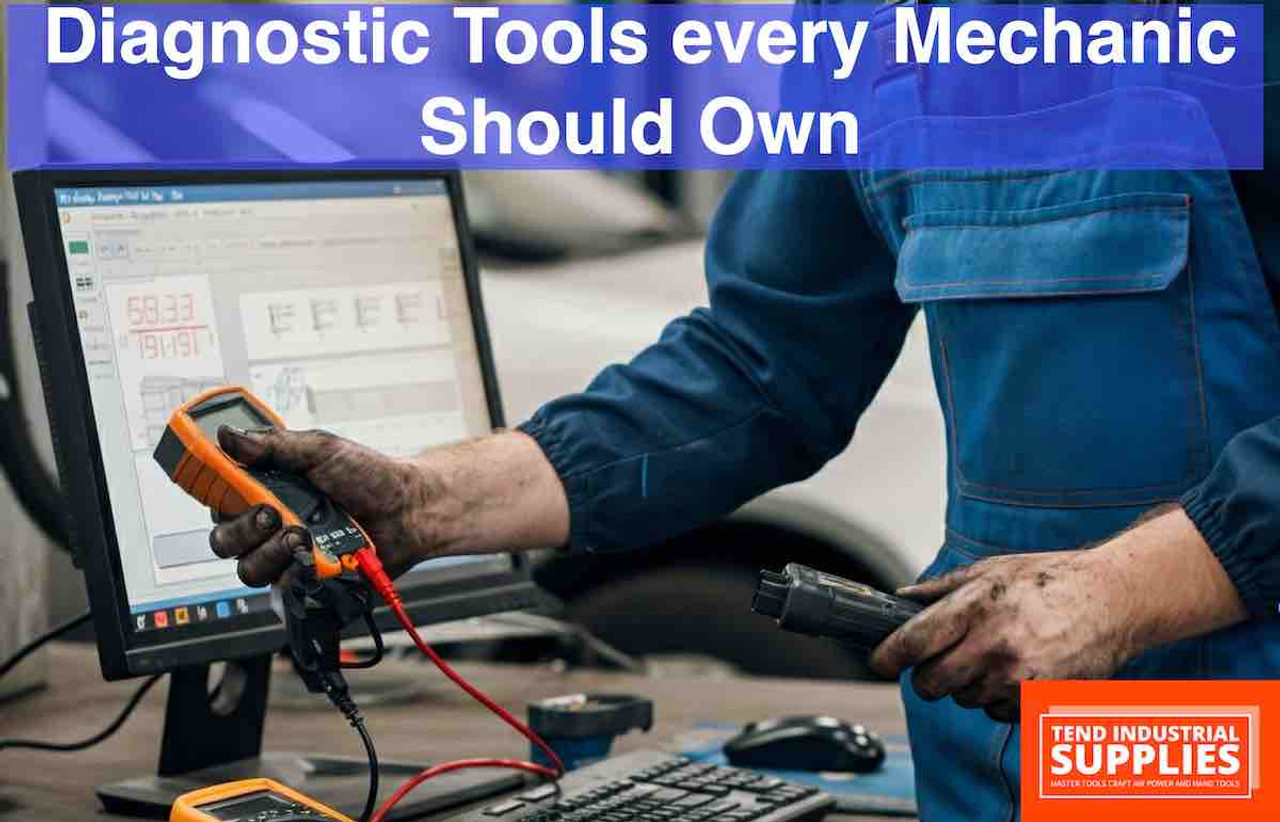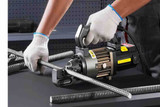The Ultimate Guide to Automotive Diagnostic Tools in 2025: From Pro-Level Scanners to Advanced System Analyzers
Diagnostic Tools Every Mechanic Should Own
The modern vehicle is a marvel of engineering, a complex ecosystem of interconnected computers, sensors, and actuators that work in harmony to deliver a safe, efficient, and comfortable driving experience. However, when something goes wrong, this complexity can become a significant challenge for even the most experienced mechanic. The days of diagnosing a problem with a simple test light and a good ear are rapidly fading. In 2025, a professional technician's most valuable tool is not a wrench, but a sophisticated diagnostic scanner that can communicate with the vehicle's intricate electronic nervous system [1].
The global automotive diagnostic scan tools market has reached an impressive USD 36.1 billion in 2025 and is projected to grow at a 5.3% CAGR, reaching USD 57.3 billion by 2034 [2]. This growth is driven by the increasing complexity of modern vehicles, the rise of electric and hybrid powertrains, and the integration of advanced driver assistance systems (ADAS) that require specialized diagnostic capabilities.
This guide, curated by the experts at Tend Industrial Supplies, provides a comprehensive overview of the top automotive diagnostic tools for 2025. We will explore the different tiers of diagnostic scanners, from professional-grade workhorses to advanced DIY tools, and delve into the world of specialized analyzers like oscilloscopes and thermal imaging cameras. Whether you are a seasoned professional seeking to enhance your diagnostic capabilities or a dedicated DIY enthusiast eager to elevate your skills, this guide will empower you to make an informed decision and invest in the right tools for the job.

Key Takeaways
The automotive diagnostic landscape has undergone significant evolution, and understanding these key insights will enable you to make informed investment decisions for your workshop or garage.
Bi-Directional Control is the New Standard: For professional diagnostics in 2025, the ability to command vehicle components (bi-directional control) is no longer a luxury but a necessity for efficient and accurate troubleshooting. This technology allows technicians to actively test components rather than passively reading codes, reducing diagnostic time from hours to minutes.
The Rise of EVs and Hybrids: The growing market for electric and hybrid vehicles demands specialized diagnostic tools that can safely and effectively analyze high-voltage systems and battery management systems. Traditional OBD-II scanners are insufficient for these advanced powertrains [4].
Wireless and Cloud-Based Solutions are Transforming the Workflow: The integration of Bluetooth, Wi-Fi, and cloud-based platforms is revolutionizing how technicians diagnose and manage vehicle data, enabling remote diagnostics and seamless data sharing across multiple devices and locations [5].
A Tiered Toolset is the Most Effective Approach: a combination of a primary bi-directional scanner and specialized analyzers, such as oscilloscopes and thermal imagers, provides the most comprehensive diagnostic capability for modern vehicles.
Top Brands for 2025: The market for professional diagnostic tools is led by innovative brands such as Autel, Launch, and TOPDON, while PicoScope remains the gold standard for automotive oscilloscopes
The 2025 Diagnostic Tool Landscape: A Tiered Approach
The market for automotive diagnostic tools can be broadly categorized into three tiers, each designed to meet the needs of different users, from the casual DIYer to the professional technician. Understanding these tiers is the first step in choosing the right tool for your specific needs and budget.

Tier 1: Professional Bi-Directional Scanners (The Workhorses)
These are the top-tier tools that form the backbone of any professional workshop. In 2025, a professional scanner is defined by its ability to perform bi-directional control, which allows the technician to send commands to the vehicle's modules and actuators. This capability is a game-changer for diagnostic efficiency, allowing for active tests that can quickly pinpoint the source of a problem.
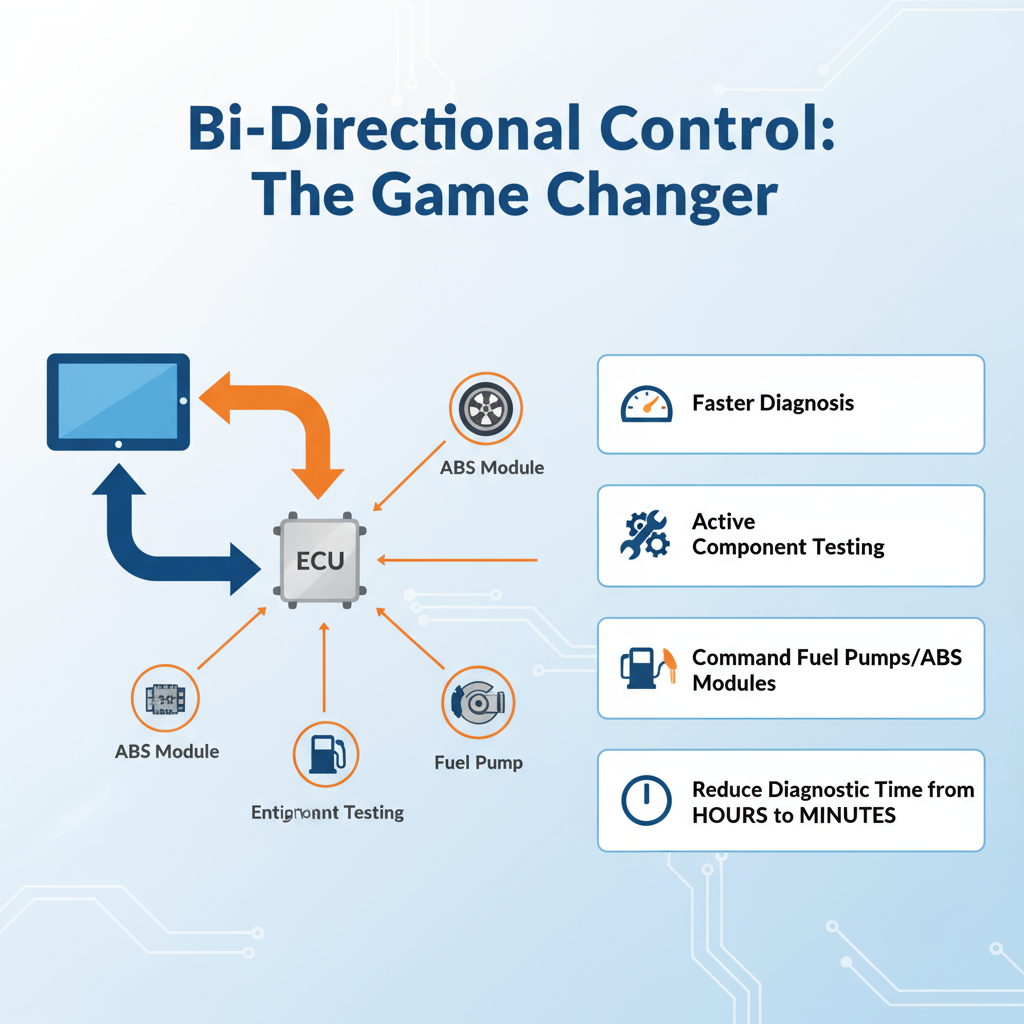
The Autel MaxiSYS MS906BT stands out as the professional workhorse for independent shops. This Android-based tablet scanner offers robust, OE-level diagnostics with full bi-directional control capabilities. Its 8-inch touchscreen provides an intuitive interface, while the stable Bluetooth VCI ensures reliable communication with vehicles. The MS906BT covers over 80 manufacturers and includes more than 30 common and advanced maintenance functions, ranging from oil resets to electronic parking brake retraction.
The Launch X431 V+ represents exceptional value in the professional category. Launch has earned a reputation for providing dealership-level functionality at competitive prices. The X431 V+ features a 10.1-inch touchscreen tablet and offers comprehensive active test functionality along with advanced ECU coding capabilities. With coverage for over 100 manufacturers, it provides an excellent return on investment for professional technicians [8].
The TOPDON Phoenix Nano is an emerging contender that strikes the right balance between professional capability and user-friendly design. This tablet-style scanner features an 8-inch touchscreen with Android-based operation and covers over 120 manufacturers. Its intuitive navigation and fast performance make it an excellent choice for technicians who want powerful diagnostics without complexity.
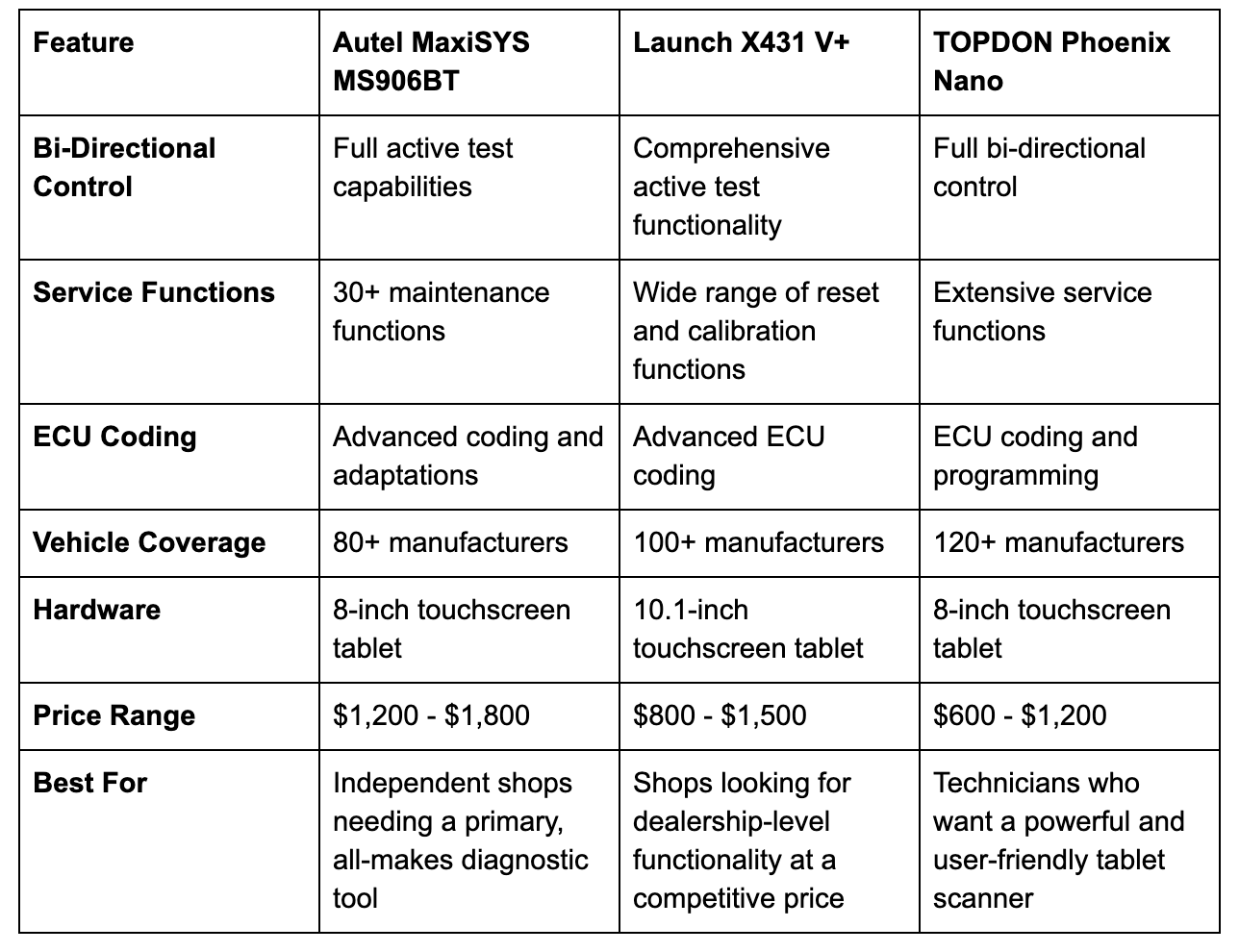
Tier 2: Advanced DIY & Prosumer Scanners (The Sweet Spot)
This category represents the sweet spot for serious DIY enthusiasts and as a secondary "quick-scan" tool in a professional shop. These scanners offer a significant step up from basic code readers, providing access to live data streams, manufacturer-specific codes, and some service functions.
The Innova 5610 is our top pick for advanced DIYers who want a powerful corded scanner. This tool offers the most diagnostic functions of any scanner in its price range, including five system and actuator tests, hybrid/EV battery test functions, and ABS bleeding procedures. Its 73-inch cord provides excellent reach, making it practical for shop use.
The BlueDriver Pro Scan Tool excels as the best wireless option in this category. This Bluetooth-enabled scanner pairs with your smartphone to provide manufacturer-specific trouble codes, live data streaming, and repair suggestions based on Identifix data. The app interface is clean and intuitive, with no subscription fees or annoying in-app purchases.
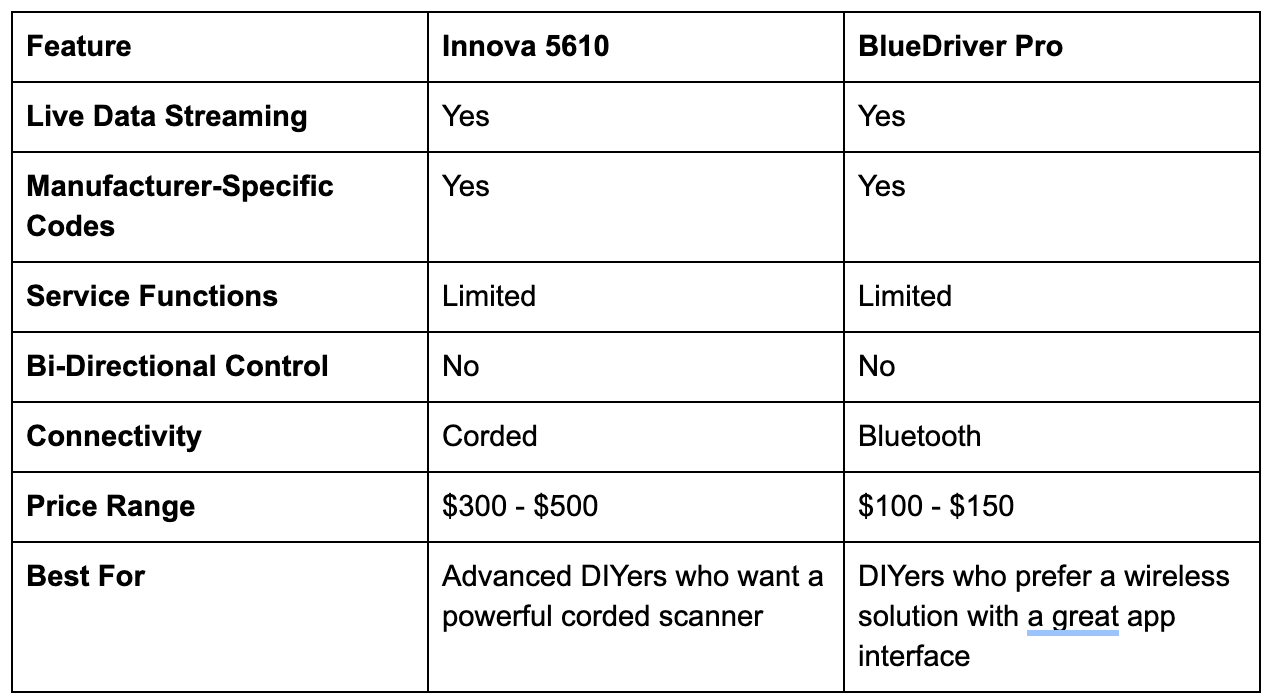
Tier 3: Essential Code Readers & Basic Tools (The Must-Haves)
While not as powerful as their more advanced counterparts, basic code readers still have a place in any toolbox. They provide a quick and easy way to read and clear generic fault codes, making them ideal for initial diagnosis and for keeping in your glovebox for emergencies.
The Bosch OBD 1200 represents reliability and precision in the basic scanner category. This tool from the respected German manufacturer offers rock-solid performance with a streamlined interface that makes sense. It pulls fault codes quickly, erases them with a simple tap, and provides inspection and maintenance readiness indicators for emissions compliance checks [12].
The Motopower MP69033 is the fastest hardwired OBD-II scanner we tested, displaying codes in just over 17 seconds. Despite its budget-friendly price, it includes a neat graphing function for certain live data PIDs and features separate up and down buttons for easy navigation [13].
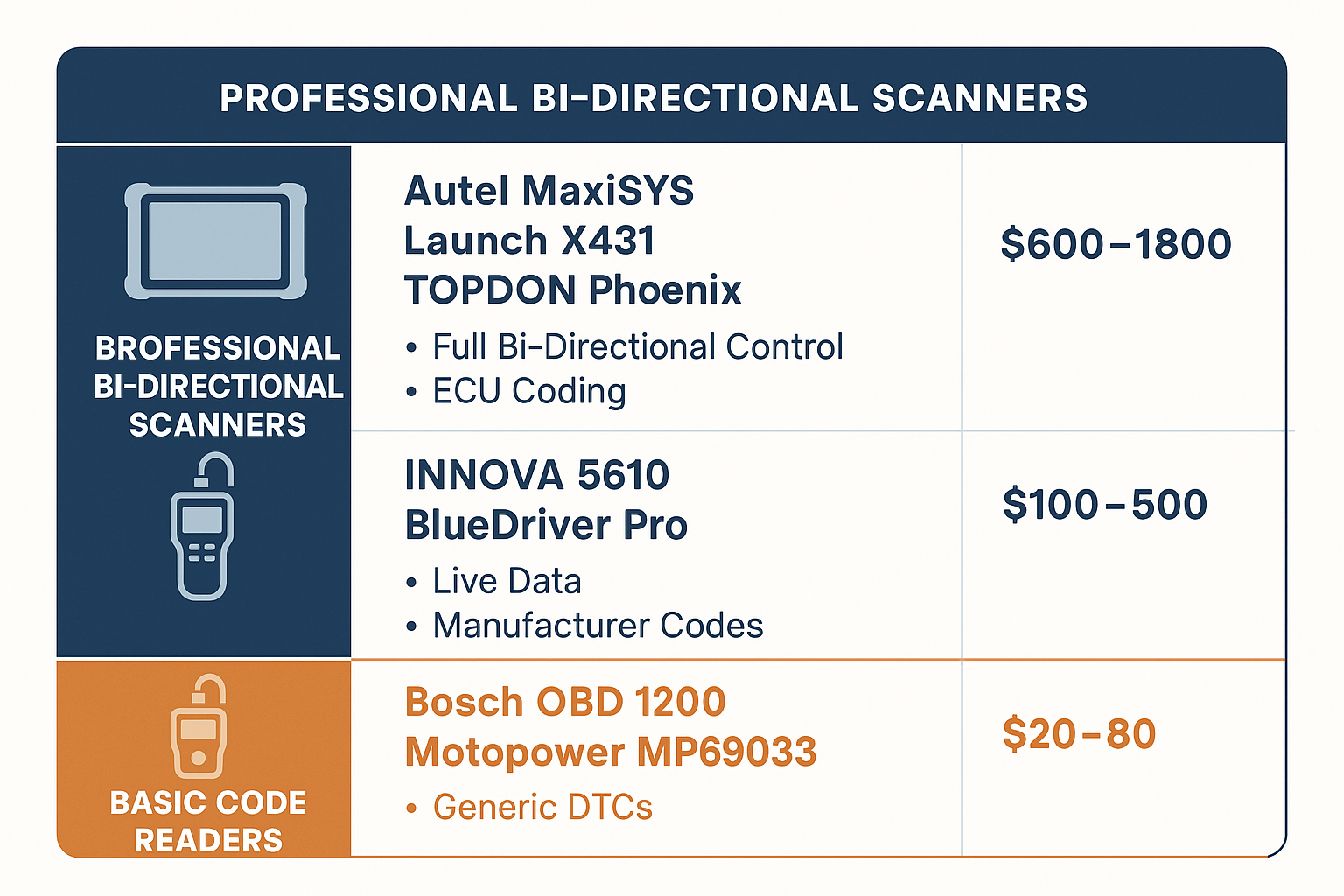
Beyond the Scanner: Advanced Diagnostic Analyzers for 2025
While a high-quality bi-directional scanner is the cornerstone of modern diagnostics, there are times when you need to go deeper to solve complex electrical and mechanical problems. This is where specialized diagnostic analyzers come into play. These tools provide a level of insight that even the most advanced scanners cannot, allowing you to visualize electrical signals, detect heat-related issues, and perform precise electrical measurements.
1. Automotive Oscilloscopes: Visualizing Electrical Signals
An automotive oscilloscope, or lab scope, is a powerful diagnostic tool that allows you to see the electrical signals in a vehicle's wiring in real-time. By displaying voltage over time, an oscilloscope can help you diagnose a wide range of electrical problems, from faulty sensors and actuators to intermittent wiring issues. In 2025, with the increasing complexity of vehicle electronics, an oscilloscope is an essential tool for any serious diagnostician.
PicoScope remains the industry standard for automotive oscilloscopes. Their range of automotive-specific oscilloscopes offers powerful capabilities with software packed with features designed specifically for automotive diagnostics. The software includes a comprehensive library of pre-set tests and waveforms, making it accessible even for technicians new to oscilloscope diagnostics [14].
For those on a tighter budget, the TOPDON Phoenix Scope Pro offers a capable 4-channel oscilloscope that serves as an excellent entry point into lab scope diagnostics. This tool allows technicians to diagnose issues with automotive electronics and wiring by capturing circuit signals in real-time [15].
2. Thermal Imaging Cameras: Detecting Heat-Related Issues
A thermal imaging camera is a non-contact diagnostic tool that allows you to see the heat signatures of various components. This technology has become increasingly valuable for diagnosing problems ranging from binding brake calipers and misfiring cylinders to electrical shorts and HVAC system issues.
The Snap-on Diagnostic Thermal Imager+ represents the pinnacle of automotive thermal imaging technology. This professional-grade tool delivers detailed images composed of 4,800 distinct temperature zones, making it easy to identify extreme temperatures up to 840°F and pinpoint the source of heat-related problems with exceptional precision [16].
For those seeking a more compact and affordable option, the FLIR C8 next-generation compact thermal imaging camera offers faster, clearer, and more reliable inspections. This tool provides professional-quality thermal imaging in a portable package that's perfect for mobile technicians [17].
3. Advanced Multimeters: The Foundation of Electrical Diagnostics
While not as glamorous as a high-end scanner or an oscilloscope, a quality multimeter remains a fundamental tool for any mechanic. It is essential for performing basic electrical tests, such as measuring voltage, current, and resistance. In 2025, an advanced multimeter with automotive-specific features is a must-have for any serious technician.
The Fluke 117 multimeter is specifically designed for automotive use and is known for its accuracy, durability, and safety features. This tool provides reliable measurements in the harsh automotive environment and includes features specifically designed for automotive electrical diagnostics [18].
Comprehensive Comparison: Choosing the Right Diagnostic Tool
|
Tool Category
|
Best Overall
|
Price Range
|
Key Features
|
Ideal User
|
|
Professional Scanners
|
Autel MaxiSYS MS906BT
|
$600 - $1,800
|
Bi-directional control, ECU coding, 80+ manufacturers
|
Professional shops, independent technicians
|
|
Prosumer Scanners
|
Innova 5610
|
$100 - $500
|
Live data, manufacturer codes, limited service functions
|
Advanced DIYers, secondary shop tool
|
|
Basic Code Readers
|
Bosch OBD 1200
|
$20 - $80
|
Generic DTCs, emissions readiness
|
Basic DIY, emergency diagnostics
|
|
Oscilloscopes
|
PicoScope
|
$500 - $2,000+
|
Electrical signal analysis, waveform capture
|
Electrical specialists, advanced diagnostics
|
|
Thermal Cameras
|
Snap-on Thermal Imager+
|
$300 - $3,000+
|
Heat signature detection, 4,800 temperature zones
|
Professional shops, HVAC diagnostics
|
|
Multimeters
|
Fluke 117
|
$50 - $300
|
Precision measurements, automotive-specific features
|
All technicians, electrical diagnostics
|
Frequently Asked Questions (FAQs)
Q1: Why is bi-directional control so important in a 2025 diagnostic scanner?
A1: Bi-directional control allows the scanner to send commands to the vehicle's modules and actuators, enabling active component testing. This capability is crucial for modern diagnostics, as it enables you to perform tests such as activating a fuel pump or cycling an ABS module, which can significantly reduce diagnostic time and help pinpoint problems with much greater accuracy than passive code reading alone.
Q2: Do I need a special scanner for electric and hybrid vehicles?
A2: Yes, while many high-end scanners offer some EV and hybrid diagnostic capabilities, it is highly recommended to use a scanner with specialized features for these vehicles. EVs and hybrids have high-voltage systems that require specific safety precautions and diagnostic procedures. A specialized scanner will have the necessary software and hardware to safely and effectively diagnose these complex systems.
Q3: How important are software updates for my diagnostic scanner?
A3: Software updates are absolutely critical for any professional diagnostic scanner. The automotive industry constantly evolves, with new vehicle models and technologies introduced every year. Regular software updates ensure that your scanner remains compatible with the latest vehicles and features the most up-to-date diagnostic information. Many professional scanners include one year of free updates, with subscription services available thereafter.
Q4: Can I use a single diagnostic tool for all my needs?
A4: While a high-quality bi-directional scanner can handle the vast majority of diagnostic tasks, a truly comprehensive diagnostic approach involves a tiered toolset. This typically includes a primary scanner for all makes and systems diagnostics, as well as specialized analyzers such as an oscilloscope and a thermal imager, for in-depth electrical and mechanical analysis. The combination provides the most complete diagnostic capability.
Q5: What are the top diagnostic tool brands to consider in 2025?
A5: For professional bi-directional scanners, the leading brands in 2025 are Autel, Launch, and TOPDON. For automotive oscilloscopes, PicoScope is the industry leader. For thermal imaging, Snap-on and FLIR offer the most advanced solutions. These brands have proven track records of innovation, reliability, and customer support in the automotive diagnostic market.
Related Articles
Expand your knowledge of automotive tools and diagnostics with these related articles from our blog:
Conclusion: Investing in Your Diagnostic Future
The world of automotive diagnostics is more complex and exciting than ever before. The right set of diagnostic tools can empower you to tackle any challenge that rolls into your service bay, from a simple check engine light to a complex electrical issue on a hybrid vehicle. By investing in a high-quality bi-directional scanner and supplementing it with specialized analyzers, you are not just buying tools—you are investing in your efficiency, your accuracy, and your future as a professional technician.
The diagnostic tools market continues to evolve rapidly, with wireless connectivity, cloud-based solutions, and AI integration becoming standard features. Staying ahead of these trends and investing in the right tools today will position you for success in the increasingly complex automotive landscape of tomorrow.
Ready to upgrade your diagnostic capabilities? Explore our extensive selection of professional-grade diagnostic tools at tendsupplies.com. Our team of experts is here to help you choose the right tools for your specific needs and budget. Contact us today at sales@tendsupplies.com or call us at +1 443-204-1972 for personalized recommendations and expert advice. For technical support and product questions, reach out to our support team at support@tendsupplies.com.
References
Service Alert for Maryland Car Owners
mobile vehicle diagnostics in Baltimore
30th Sep 2025


